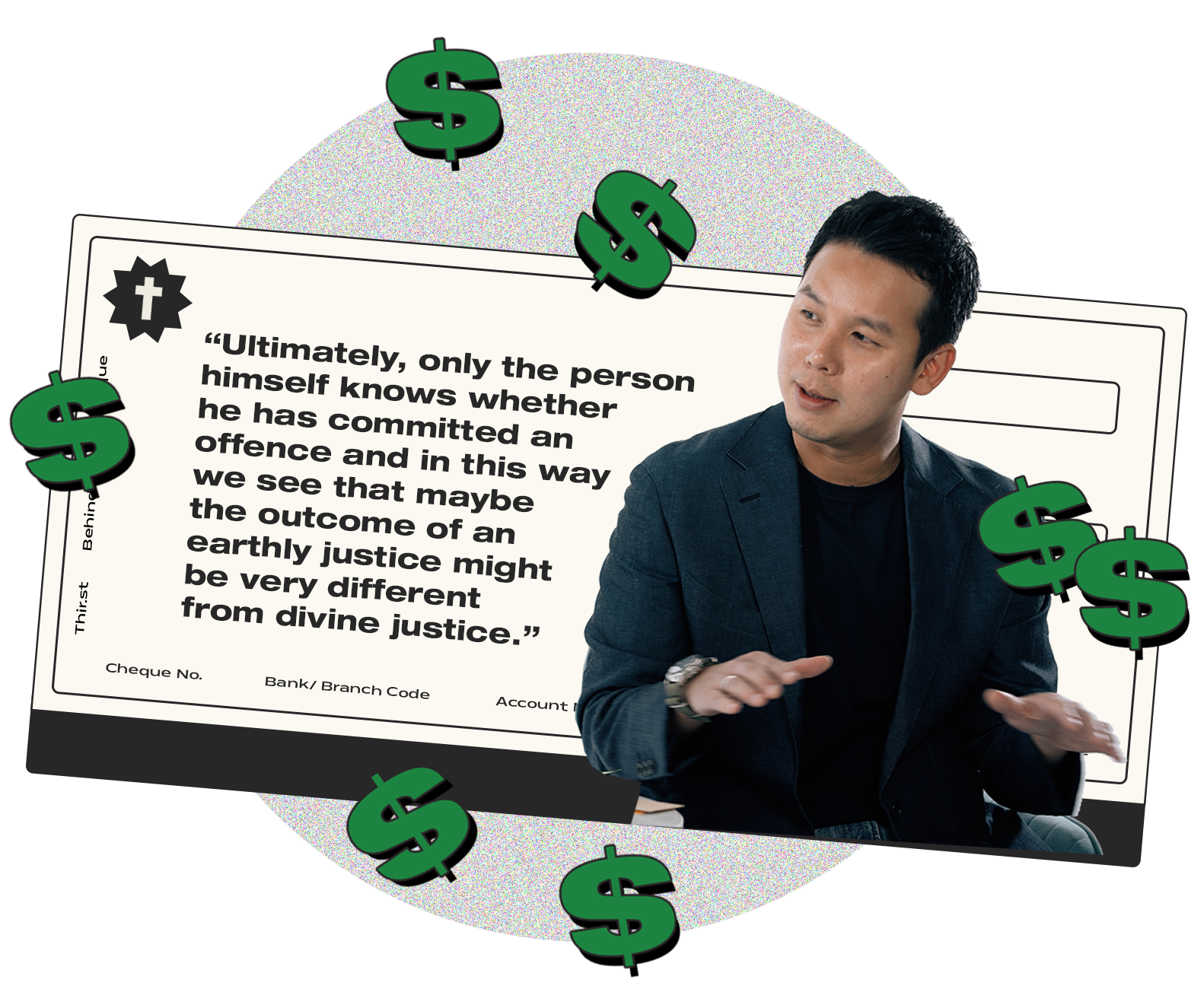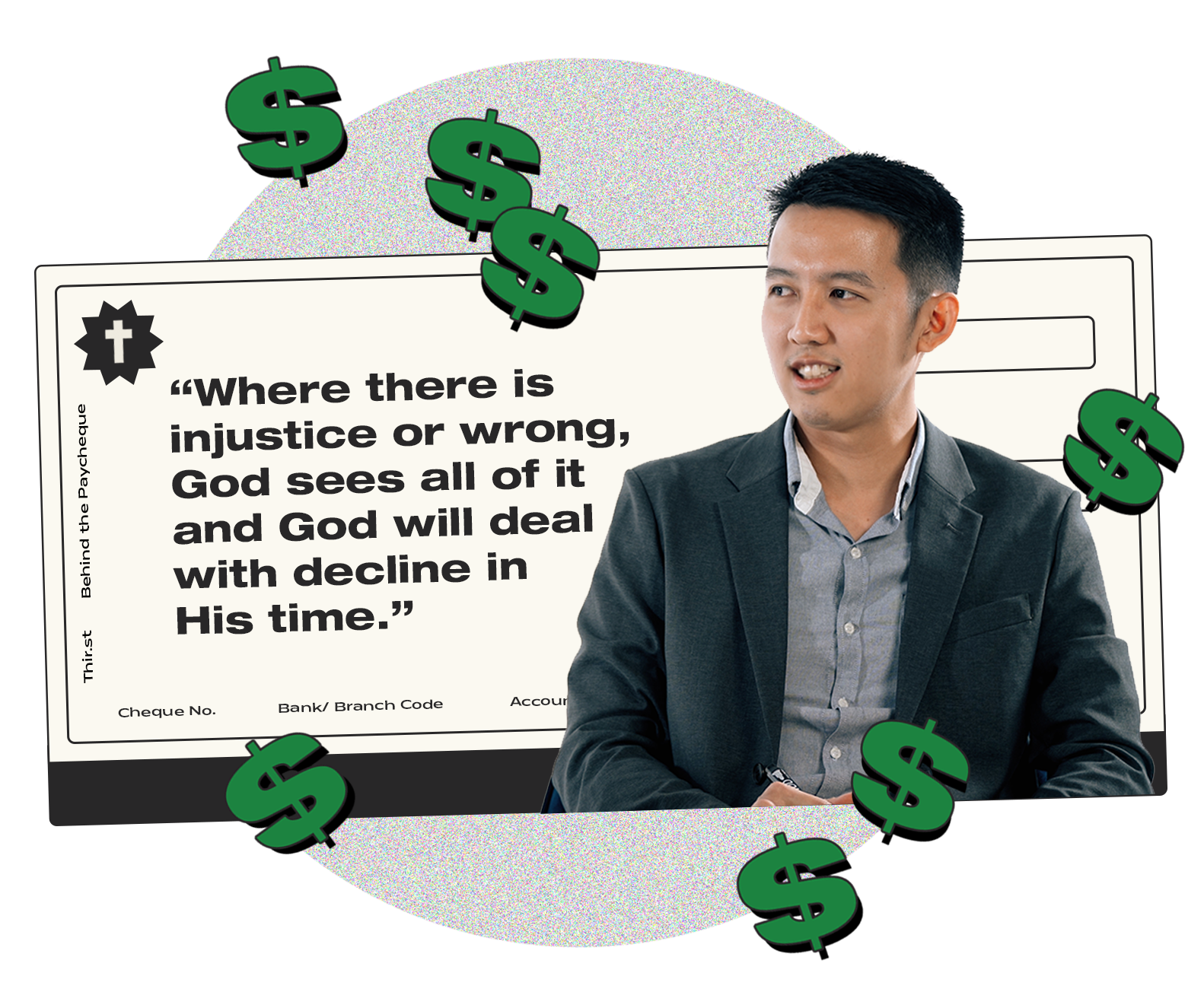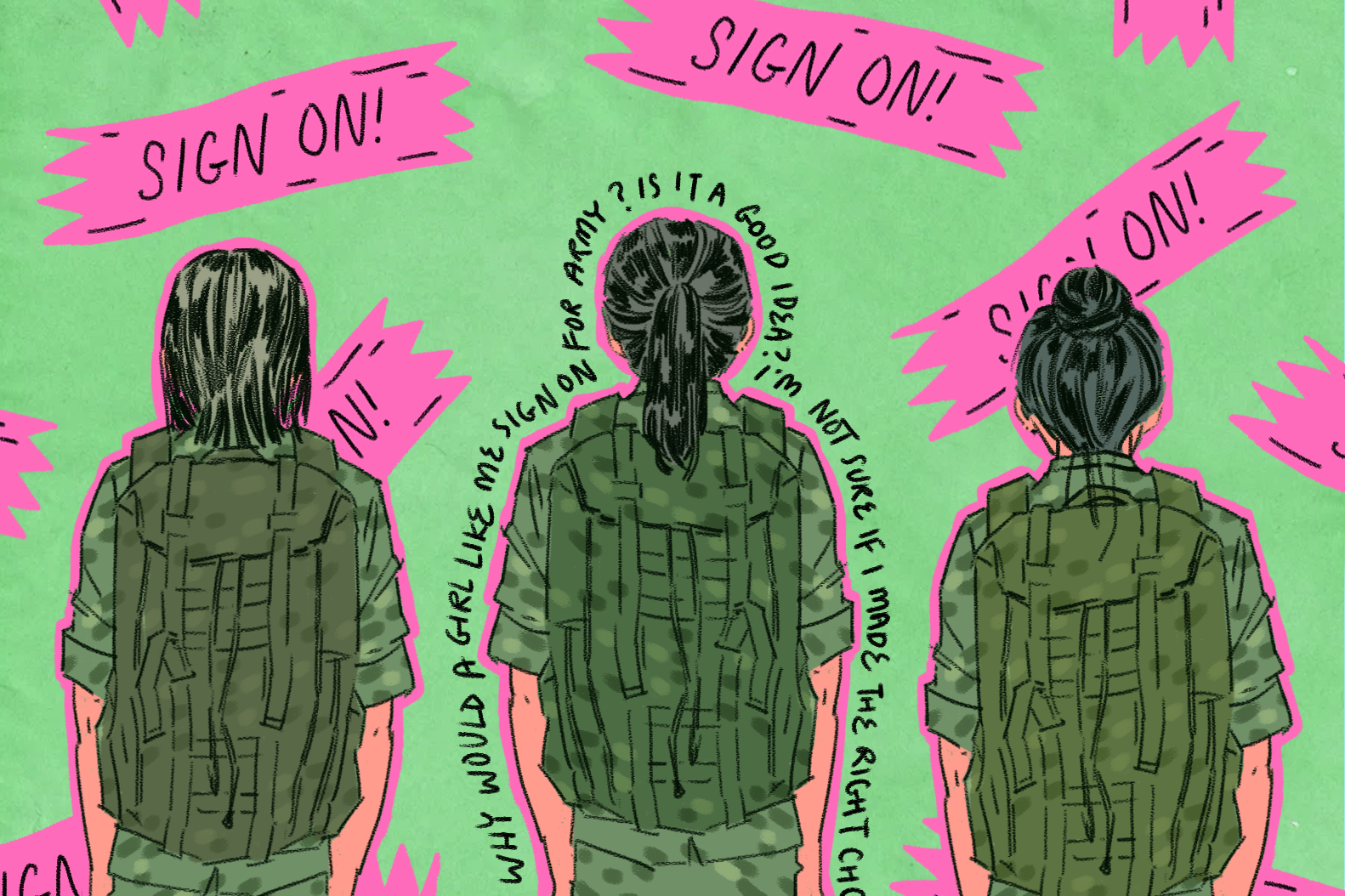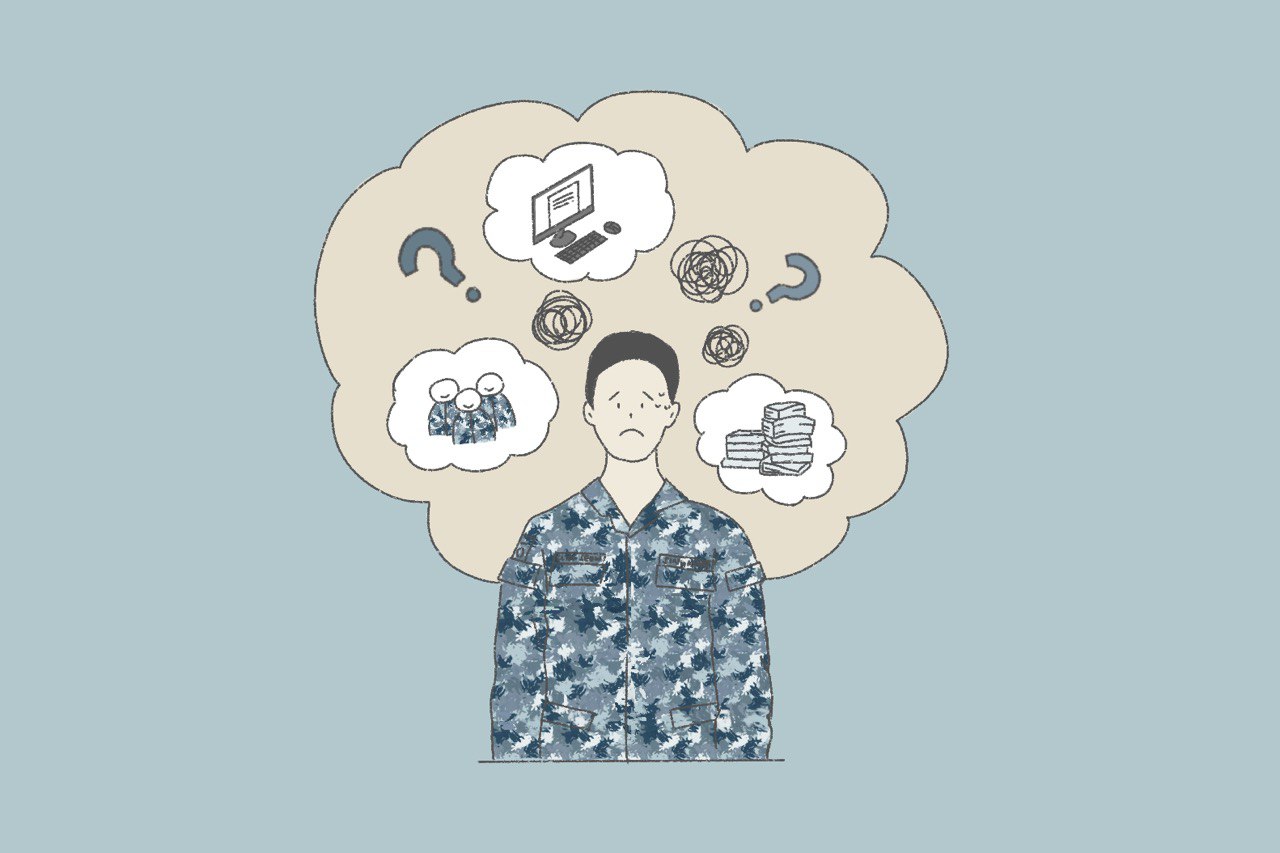A sword, a balance scales and a blindfold.
These items, unanimous with the Lady Justice, symbolise power, impartiality and objectivity in the judicial system.
Yet, in reality, the execution of justice is tricky because of so many factors at play.
In this episode of #BehindThePaycheque, two Christian lawyers share how they reconcile an imperfect system with God’s perfect justice, and how they live out their faith at work.
Both have backgrounds in dispute resolution, which involves helping individuals or organisations resolve any legal conflicts that they face.

Earthly vs divine justice
Handling all areas of practice, Jonathan admitted that early on in his career, he had to grapple with certain legal outcomes that did not turn out as expected.
“You see that a lot in civil litigation because you think you’re in the right, and I think I’m in the right,” he elaborated. “So justice to me looks very different for you.”
Acknowledging that tension, he eventually recognised that earthly justice can only approximate divine justice.
“It can only try to mirror that — and that should spur us on to really seek the vindication of God; to seek the decision, judgement and thoughts of God about what is the truth of the matter, or what’s right or wrong at the end of the day,” said Jonathan.

As a lawyer whose main practice is in the area of criminal law, Mark also agreed that earthly justice has its limits.
He described: “One of the big complaints about lawyers in general is that, especially in crime, they help guilty people go free.”
But as humans, lawyers can only go so far because of the information that’s available.
“Ultimately, only the person himself knows whether he has committed an offence, and in this way we see that maybe the outcome of earthly justice might be very different from divine justice,” said Mark.
That doesn’t mean it all just ends there.
“Where there are injustices or where there are wrongs… we know that God sees all of them and God will deal with them in His time,” he continued.
“We can say that this is the earthly justice meted out by the courts, yet at the same time we trust in a higher level of justice in the divine realm.”
Thoughts on the death penalty
Both lawyers agreed that the laws of the land, including the death sentence, are there to protect the greater good.
“We can see the policy rationale behind it; we can see what the government is trying to do,” Mark noted. “But in terms of how often it should be exercised, I think the less the better.
“If we believe in second chances, restoration of lives and reconciliation of relationships, then if a person is put to death for an offence, there is no chance for rehabilitation, repentance, turning over a new leaf and going out to be a contributing member of society.”
Jonathan concurred.
“Every society is just trying to do their best, and we have different configurations depending on our particular context, history and culture,” he commented.
The concern with regard to the death penalty is that there is a time limit on how much the person gets to live out the full restorative process, shared Jonathan.
At the same, he pointed out that earthly punishment doesn’t detract from the second chance that God gives to every person.
“There are so many stories where — God in His mercy and His grace, that in the course of waiting for that time, that final punishment — people reconcile, they come to terms with what they’ve done and they make the best of it,” said Jonathan.

“Biblically speaking, Jesus was executed beside two robbers — one repented, one didn’t,” Mark reminded.
“And that’s where we see that even though one was literally being executed next to Jesus, there was still time for reconciliation, restoration and eventually even looking forward to being with Jesus in paradise.
“Even if we think that a person’s life has ended prematurely, there is still hope for a future and a hope of eternity that we can cling to and rely on.”
The fact that Jesus was sentenced to the death penalty also gives us something to ponder about, Jonathan mused.
“It’s amazing that God incarnate can say to a man, a criminal, an offender who’s being punished, ‘I know what you’re going through. And therefore, you have an intercessor and a representative in Me before the throne.
“‘Because of what I’ve done and the price I paid, that is not the end of the story for you.’
“What a beautiful story of redemption.”
We’re not all that different
While it may be easy to draw the line between us and those who have done wrong, both lawyers said that it’s actually not that difficult to empathise with the person before them.
“There are people who commit offences for real issues. Maybe they’re mired in debt, maybe out of anger they did something foolish,” Mark highlighted.
He added that a lot of their job requires them to relate with their client, understand what they are going through and journey with them through the process, which “one could say is more difficult than than the legal question itself”.
“On a deeper level, a lawyer really is a counsellor as well as a minister,” said Jonathan with a smile.
While we might not have been through that same situation, there are human emotions, frustrations and motivations that are not that difficult to identify with, Jonathan remarked.
“After all, men fall short of the glory of God. So we’re all on the same starting point in that sense.”
What do you hope to achieve as a Christian lawyer?
Rounding off the interview, Mark and Jonathan shared how they see their profession as more than just a job.
Explaining that his role brings to mind God’s reconciling work in this world, Jonathan said: “As a dispute resolution lawyer, reconciliation is a big part of this.
“It’s about helping people resolve their disputes — not just about winning and losing, but true reconciliation, true restoration of relationships or situations.
“Hopefully, through that, through the interpersonal relationship that you have as lawyers with your client, they will begin to see a picture of who God is really like, what God is like and what his kingdom looks like.”
Drawing parallels between a lawyer and Jesus, Jonathan said: “We are told that Christ is our advocate, our representative.
“And it’s such a precious thing to be able to reflect Christlikeness — in representing people, journeying with them, playing almost a priestly kind of role and representing men before a judgement seat.”
Ultimately, both hope to make God known through what they do.
Mark concluded: “When the question asks, ‘What do you hope to achieve?’ From a very general big picture, it’s to be a faithful, obedient Christian. It just so happens that we’re in the field of law at this moment.
“If and when God calls us out, then we will try to achieve the same thing as a Christian in whatever that vocation may be.”









